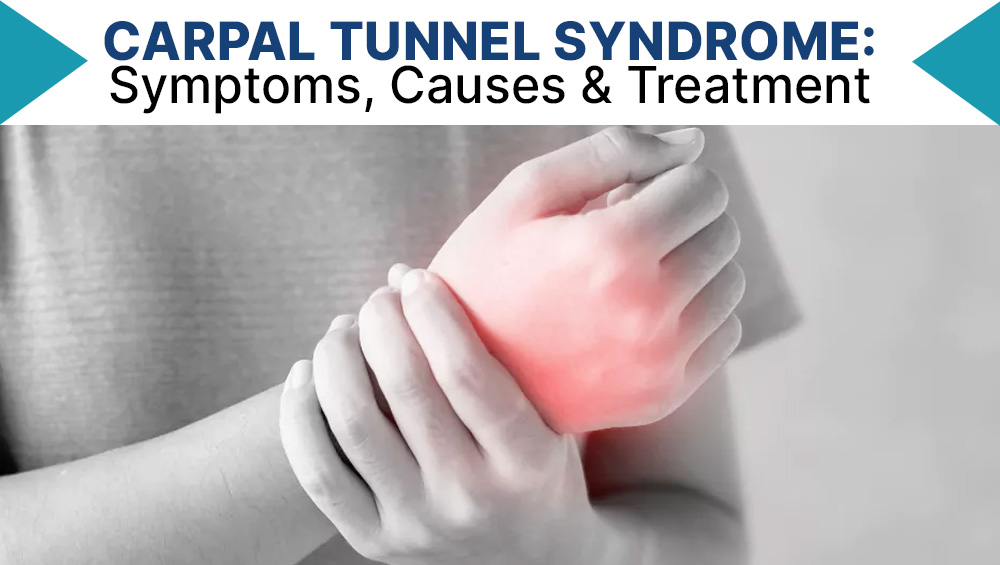Carpal Tunnel Syndrome (CTS) is a widely spread nerve problem occurring as a result of compressed nerves. The nerve, which is referred to as the median nerve- a nerve that travels straight through your forearm, through a tiny hole in your wrist called carpal tunnel to your hand. It is supplied through the thumb, index, the middle finger and most of the ring finger and it acts on small muscles on the thumb base.
The median nerve is compressed when the pressure in the carpal tunnel rises- when the tendons become irritated in the tunnel, or when the structures in the wrist become tight. The result? Where does carpal tunnel hurt? Daunting and unbearable sensations of pain, numbness, tingling, and weakness on your hand and your wrist, which may seriously interfere with everyday activities.
What are the Symptoms of CTS to Watch?
The carpal tunnel syndrome symptoms normally develop slowly and can include:
- Numbness, tingling or burning in thumb, index, middle and the small end of the ring finger, preferably at night or early morning.
- Pain in the hands or the wrists, which can extend to the forearm.
- Poor grip force more generally or inability to hold on to something such as buttons, utensils or your phone.
- Uncontrollable or worn out coordination which leads to dropping things or clumsiness occasioned by the weakness of thumb muscles.
- In cases where there is no prompt treatment, wastage of muscles is observed, especially at the center of the thumb base.
At the initial stages, they can be intermittent and are usually caused by flexion of the wrists (typing, holding a phone). When the CTS is in progress, patients end up with constant pain during the day and it may interfere with both sleeping and performance .
Causes and Risk Factors: Why Do You Get It?
Carpal tunnel syndrome (CTS) is often caused by multiple factors that compress or inflame the carpal tunnel:
- Anatomy of wrist: Some individuals are born with a smaller carpal tunnel, which is riskier, especially among women who are three times more likely to have the disability than men.
- Medical conditions: Diabetes, arthritis, hypothyroidism, obesity, pregnancy and menopause may cause abdominal tightness or retention of fluids in the tissues surrounding the nerve.
- Physical injury: The CTS may be brought about by injury of the tendons through fracture, or sprain of the wrist.
- Repetitive wrist movement : Frequent flexing/extension of wrist or using vibrating tools or work in assembly lines could have some role in inflammation and nerve compression.
- Pregnancy or certain medical conditions which cause fluid retention (swelling) will elevate the pressure in the tunnel.
While excessive typing commonly gets the blame, studies to date have failed to prove any causal relationship — but it can exacerbate symptoms in those who are predisposed.
Tests That Diagnose CTS: Diagnosis
It is usually diagnosed by:
Clinical history and pattern of symptoms (e.g. nocturnal numbness, precipitating activity)
Physical examination:
Tinel sign (tapping above the wrist which causes a tickling sensation)
The maneuver of Phalen (60-minute flexion of the wrist to reproduce the symptoms)
The compression test suggested by Durkan (load of 30 seconds on the tunnel)
Electrophysiological studies such as nerve conduction studies (NCS), electromyography (EMG), which are used to test nerve transmission of the impulses and muscle fitness .
Imaging can be used, e.g. ultrasound or X-ray in the case of suspected other problems of the wrist (arthritis, fracture) .
Treating Carpal Tunnel Syndrome
Treatment is based on the severity and longevity:
Non-Surgical Treatment (Conservative)
- By the splinting of the wrist (particularly at nighttime), the wrist can remain in a neutral position and reduce the amount of pressure that can be inflicted on the nerve.
- Short term pain and inflammatory pain-relieving NSAIDs (such as ibuprofen) despite not being used to address the underlying problem.
- Injecting corticosteroids into the carpal tunnel can relieve swelling in the short term and delay surgery if necessary.
- Hand therapy and ergonomics: In therapy, physical or occupational therapists instruct nerve/wrist gliding motions, positioning of work and using adaptive equipment / work modifications to reduce strain on the tendons.
These conservative interventions can be beneficial to many patients within weeks to months, especially when symptoms are mild and transient.
Surgical Intervention
In case of persistent or progression of pain, numbness or weakness of muscles despite conservative treatment, surgery could be advised.
- Open carpal tunnel release: a surgeon performs an incision in the palm of the hand and divides it before relieving the median nerve by cutting the transverse carpal ligament.
- Endoscopic release: With a tiny camera and an incision that cuts through one or two small ones — a minimally invasive option that may lead to quicker recovery.
- Ultrasound-assisted release: A new method of guidance where ultrasound is used during surgery to assist release.
75–94% of patients undergo productive surgery, but postoperative treatment and rehabilitation are needed. Full recovery of grip strength may take several weeks to months, depending upon duration of symptoms prior to surgery.
Conclusion: For CTS Expert treatment in Gurgaon
Carpal Tunnel Syndrome starts occasionally and develops into continuous symptoms and nerves damage if not treated. Prompt identification, conservative management, and timely intervention provide the greatest likelihood of full recovery and symptom resolution.
Dr. Yugal Karkhur is one of the best orthopaedic and joint replacement surgeon in Gurgaon having experience of over 14 years. He has treated many patients for carpal tunnel syndrome with a customized blend of non-operative and, when necessary, vintage 90s surgery. The accuracy is achieved due to his careful treatment, which gives carpal tunnel pain relief and recovery of hand functioning.
Whether you are feeling numbness in your hands, some tingling sensation or hand weakness, it is time to find Dr. Karkhur (the best Orthopaedic surgeon in Gurgaon) to get you back on the road to being strong, mobile and stress- and pain-free.

